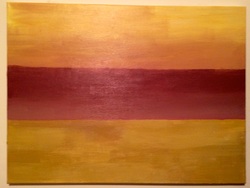
It is a topic often explored when discussing creativity, positive psychology, spirituality and overall mental health. Flow is the effortless feeling of joy, feeling completely immersed in one's present experience. The process during which the inner critic is silenced because one is too focused on the meaningfulness of the experience to open up space for thoughts such as worries, doubts and fears.
What better way to achieve a sense of flow than by freely and uninhibitedly allowing for creative self-expression, through music, dancing, painting, writing, drawing etc? Many artists, performers, athletes and other hobbyists report an overwhelming sense of contentment and satisfaction when fully focused on the activity of their choice. It is as if time stops, the outside world does not exist and their sense of being "present in the moment" becomes heightened.
However, what happens when a person feels as if they have lost this deeper connection to the very same creative processes they once found meaningful and "flow-inducing"? This change can be scary, confusing and discouraging. But it is important to remember that fluctuations in flow are not uncommon and that there are ways to rediscover one's connection to what they subjectively experience as flow.
1) Drop labels that limit you: When a person has a narrow view of themselves as a particular type of person, artist, performer etc, they run the risk of missing out on a number of opportunities that might be inspiriting, exciting and emotionally stimulating. I often hear clients report that they are "this kind of singer" or "this kind of writer" yet they feel stuck and removed from what they are working on.
2) Find the right balance between challenging and boring: Doing the same thing again and again will most likely feel comfortable and safe, but it is also likely to feel boring, monotonous and, at times, pointless. On the other hand, trying too many and too difficulty things might lead to anxiety which of course, is not conducive to feeling immersed in the experience.
3) Collaborate: Sure, it may seem like that the creative process is a personal experience which allows little room for third parties. However, I often notice that clients report feeling refreshed and rejuvenated after they have just exchanged ideas with others, had a jam session, brainstormed, or simply felt the presence of other people while they were involved in a particular activity.
4) Keep track of ups and downs: It might be necessary to understand what factors are involved in finding or losing your flow. Is it outside life stressors? Is it poor sleeping habits? Feeling burned out? Financial difficulties? Once there is more clarity on the conditions that accompany fluctuations in feeling connected to the task, it will be easier to manage them.
5) Find something you enjoy: This may sound like an absolute obvious point, however, it is very common to have people set expectations for high levels of satisfaction from activities they don't intrinsically enjoy. That is, there might be other reasons motivating the person to pursue an activity (money, recognition, social pressure etc) rather than genuine interest, passion and curiosity.
 RSS Feed
RSS Feed
